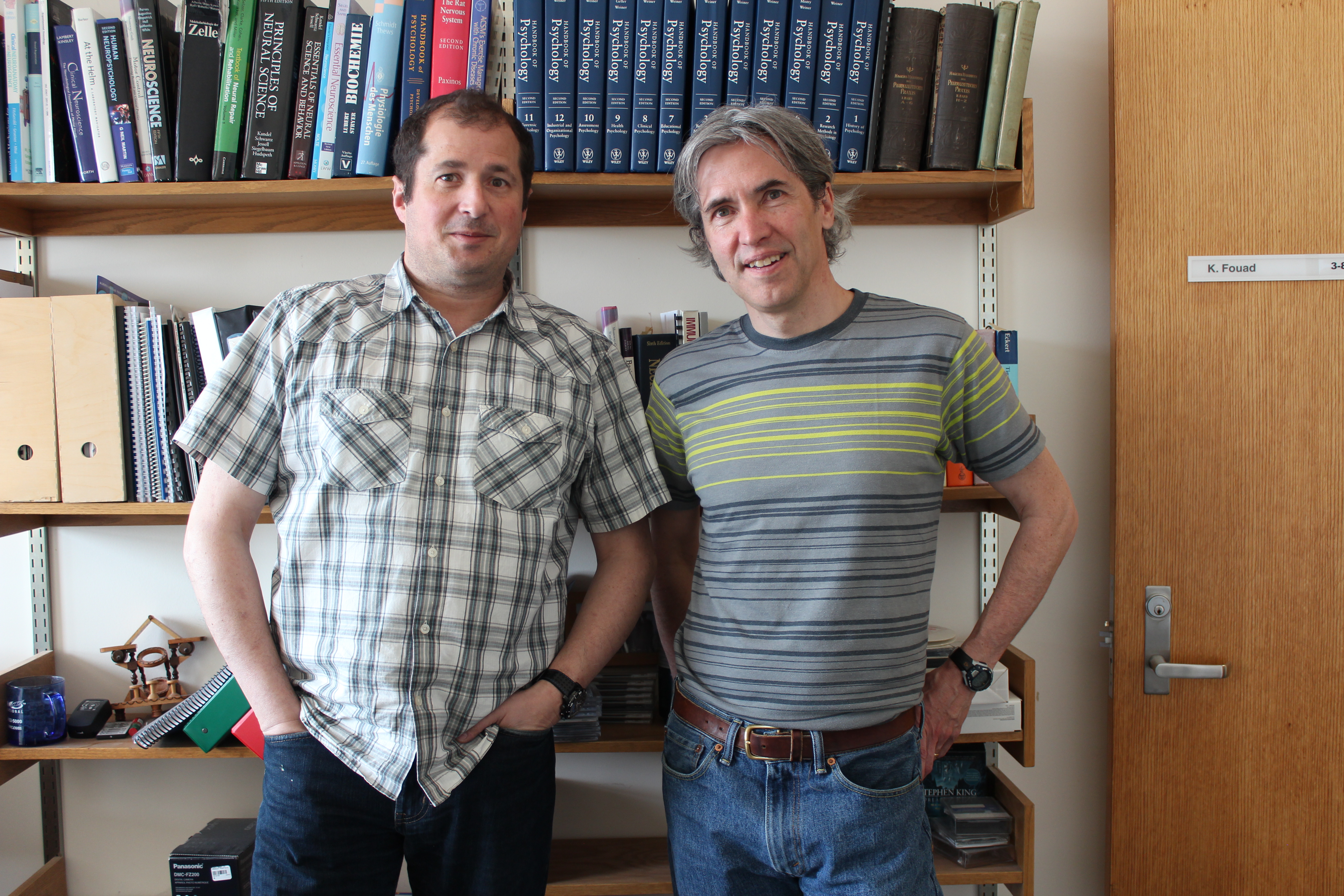
Karim Fouad (left) and David Bennett (right), professors and researchers in the Faculty of Rehabilitation Medicine
There are plenty of research studies vying for a spot on the National Institute of Health (NIH)'s awards list, but only a few make it. So when David Bennett and Karim Fouad found out their funding request had been approved, it was a welcome surprise.
"It's always good news when you receive a grant, especially an international one, but you have to be prepared to be rejected," says Bennett, professor of neuroscience at the University of Alberta.
Bennett and Fouad, a professor in the Department of Physical Therapy, Faculty of Rehabilitation Medicine, are both also members of the Neuroscience and Mental Health Institute at the U of A. Their research focuses on finding possible methods for addressing spinal cord injuries by studying the adaptations of neuronal networks within the nervous system.
"Spinal cord injuries can be a debilitating trauma to the nervous system that often leaves individuals without the ability to walk and function normally," Fouad explains.
There are approximately 4,300 spinal cord injuries per year in Canada, which means that the need for answers, and the financial support to help find them, is at an all-time high. In collaboration with their research colleague, CJ Heckman, the pair received a total grant of close to $2 million dollars spread out over five years. This equals out to around $370,000 per year-their largest funding to date.
"This grant will help us take our research further," says Bennett. "We're both interested in knowing more about how the spinal cord controls movements and posture, and how it deals with the aftermath of injury."
Fouad's research is centered on understanding what's happening in the spinal cord following injury, and how this process can be used to formulate treatments. In other words, he is taking a closer look at how the nervous system functions and whether or not it can successfully adapt to injuries and promote recovery.
"We're finding that the nervous system is actually quite adaptive after injury," says Fouad. "There are changes at every level after an injury, and these changes allow for a certain degree of recovery."
Fouad explains injury to the nervous system in terms of building blocks.
"If you were to throw a block structure on the ground, it is damaged," he explains. "You can't fix the broken pieces, but you can use the intact loose pieces that have fallen off to rebuild it."
Bennett's research is working in parallel by delving into how neurons play a part in the recovery process.
"For many years my lab has been involved in understanding posture, and muscle spasms and contractions that occur after a spinal cord injury," Bennett explains. "We're rapidly starting to understand the neurons that are involved with that, specifically the network of neurons that is located in the dorsal horn."
Bennett's recent findings show that the neurons that generate our ability to walk and the neurons that generate spasms are mutually inhibitory. When the neurons that generate walking are turned on, the neurons that generate spasms are turned off, and vice-versa.
With this information on-hand, the researchers are currently trying to find a method to turn on and control the neurons manually, so that individuals with spinal cord injuries may someday be able to walk on their own.
Of course, new methods in the research field are always hopeful, but the pair don't discount the great strides patients can make utilizing rehabilitation services.
"There are many chemical and genetic methods we can use, but by far the most successful method is simply rehab," says Bennett. "It's like anything-use it or lose it. The structure won't rebuild itself, you have to help it."
With much research still left to do before an effective treatment can be found, Fouad certainly has the motivation he needs to keep him going.
"When I saw evidence that the nervous system can adapt, it was mind-blowing for me," says Fouad. "That has been an inspiration ever since."
And Bennett?
"One word: serendipity," he says, "If you're not doing the basic research and discovering things by mistake, you won't find what you need. I've learned to expect the unexpected."
Fouad agrees: "When we see some light we just follow it."